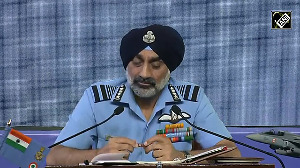Rejecting Opposition criticism and allaying fears by Left party allies on the India-US nuclear deal, Prime Minister Manmohan Singh on Friday asserted that his government will never compromise on the country's fundamental and strategic needs.
Making a statement in Parliament on his recent official visit to the US, Singh brushed aside opposition apprehensions on the joint statement issued in Washington after his talks with United States President George W Bush.
"There is nothing in this joint statement that amounts to limiting or inhibiting our strategic nuclear weapons programme over which we will retain unrestricted, complete and autonomous control," he stressed.
In a half an hour statement that was interuppted by the thumping of desks by the treasury benches, Dr Singh maintained that the government of India had not compromised in any manner while reaching the controversial agreement.
Congress president Sonia Gandhi, former prime minister Atal Bihari Vajpayee and leader of the opposition Lal Kishenchand Advani were amongst the listeners.
"I venture to think that my visit to the United States has opened up new opportunities and possibilities for promoting our energy security and pathways to accelerated social and economic development," he said.
Dr Singh said that his discussions with President Bush and members of his administration were fruitful and productive.
During his 25 minute speech, he said that our inheritance gives us confidence, our experience gives us courage and our belief gives us conviction to assert today that our nation stands on the threshhold of an even better future.
He claimed that the changes that have taken place in the economic sector in particular since 1991 have given us a stronger capability to work with the government of US on more equal terms as both India and US address common concerns and challenges.
Observing that the basis for the understanding was a clear recognition that India is a responsible nuclear power, he made it clear that the government will not allow any fissile material shortages or any other material limitations on the
country's strategic programmes in order to meet current or future requirements.
"I would like to make it clear that our commitments would be conditional upon, and reciprocal to, the US fulfilling its
side of this understanding," he said.
The Prime Minister, who made identical statements in both Lok Sabha and Rajya Sabha, said the joint statement referred to 'our identifying, and separating civilian and military nuclear facilities in a phased manner and taking a decision to place voluntarily civilian nuclear facilities under International Atomic Energy Agency safeguards'.
Asserting that India will never accept discrimination, he said 'reciprocity' was key to the implementation of all the steps enumerated in the joint statement.
Contending that India expected a close co-relation between the actions to be taken by it and the US, Singh said, "Indian
actions will be contingent at every stage on actions taken by the other side (the US)."
"Should we not be satisfied that our interests are fully secured, we shall not feel pressed to move ahead in a pre-determined manner," he said.
Dr Singh said the phased action, in terms of identification and separation of civilian nuclear facilities based solely on India's own duly calibrated national decisions, will be taken at appropriate points in time, consistent with the national security interests.
"Before voluntarily placing our civilian facilities under IAEA safeguards, we will ensure that all restrictions on India
have been lifted. Our autonomy of decision-making will not be circumscribed in any manner", he asserted.
He emphasised that the basis for this understanding was a clear recognition that India was a responsible nuclear power
with an impeccable record on nuclear non-proliferation.
"The defence and security interests of our country are our highest priority and will continue to remain so," Singh said.
Observing that New Delhi's policies and actions have earned the country global recognition and widespread esteem,
Dr Singh said, "This allows us not only to make a credible case for an end to three decades of technology denial, but also to find a central and growing place in international organisations."
During his US visit, he said he had also made a compelling case for India to be admitted as a permanent member
of the United Nations Security Council.
However, "the US has a different position on this matter and has not found it possible to endorse India's position. It
is my hope that over time the US will recognise the validity of what we say," he said, adding that the Indo-US Joint
Statement reflected Washington's 'growing recognition' of this position.
Dr Singh said his US visit was 'undertaken solely with the purpose of enhancing relations with one of the world's pre-eminent powers so as to widen our development options' and maintained that it was in endeavour to 'expand our access to energy supplies to fuel our growth, while protecting our strategic interests'.
"I believe our effort to undo some of the long-standing restrictive nuclear regimes will enable us to secure access to the significantly greater quantities of energy that we will need to spur massive consumer growth in our industrialisation programme," Dr Singh said.
Secured, cheap and affordable energy would enable the country to leapfrog its current pace of economic growth, he said.
Concluding his remarks, Dr Singh said, "Our commitment to work for universal nuclear disarmament in the long run will remain our core concern."
Dr Singh, who had met the US Vice President and senior Cabinet members of the US administration like Secretary of State Condoleeza Rice and Defence Secretary Donald Rumsfeld, said his visit to the US had opened up new opportunities and possibilities for promoting India's energy security and pathways to accelerated social and economic development.
He said the US side has undertaken to adjust its laws and policies domestically and to work with its friends and allies to adjust relevant international regimes.
The agreement with the US should open up the possibility of India being able to access nuclear fuel and nuclear power reactors and other technologies from outside to supplement its domestic efforts, he noted.
Dr Singh said full civilian nuclear co-operation would include, but not limit itself, to the expeditious consideration of fuel supplies for the Tarapur plant.
There will be a discussion on Dr Singh's statement in Lok Sabha on Monday and later in Rajya Sabha.
With PTI inputs





